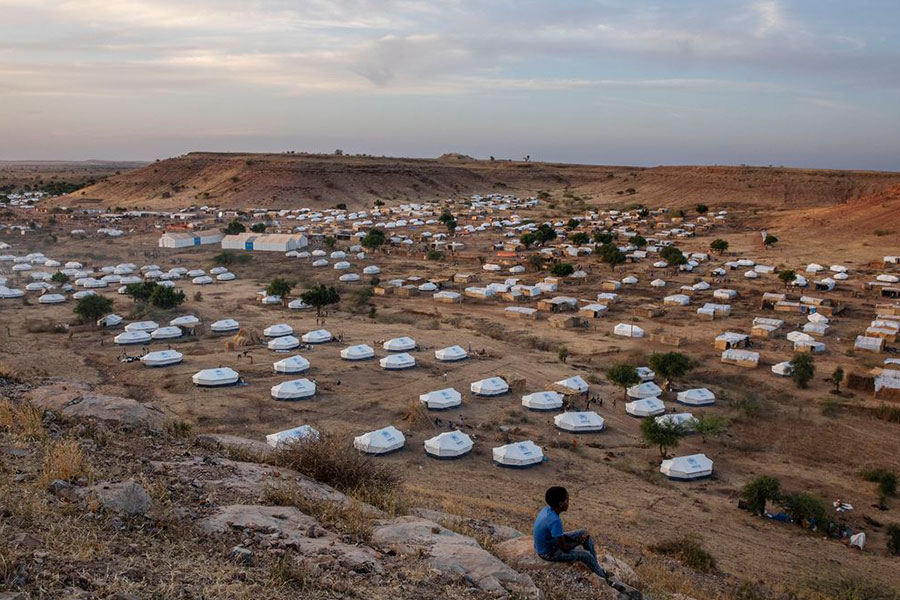
Fortune News | Oct 27,2024
Aug 5 , 2023
By Jordan Dey
This year marks the halfway point for implementing the Sustainable Development Goals (SDGs), the ambitious set of global targets introduced by the United Nations (UN) in 2015.
These 17 goals, devised to address today's most pressing challenges and put the world on the path to sustainability, seek to reduce poverty, improve access to healthcare and education, and mitigate the worst effects of climate change by 2030. But when it comes to meeting the critical goal of eradicating food insecurity, much of the progress made over the past decade has been undone.
When the SDGs were launched, the target of eliminating food insecurity and malnutrition worldwide within 15 years seemed ambitious but within reach. At the time, hunger levels had been trending lower for over two decades, largely thanks to rising agricultural productivity and global economic growth. Over the past few years, however, the world has been hit by a series of compounding crises, from the COVID-19 pandemic and the ongoing war in Ukraine to extreme weather events caused by climate change. As a result, global hunger has surged, with the world's poorest people suffering the most.
According to a new UN report, approximately 735 million people are experiencing food insecurity, an increase of 122 million people since 2019. Alarmingly, seven countries – Somalia, Afghanistan, Burkina Faso, Haiti, Nigeria, South Sudan, and Yemen – are now on the brink of famine. Not only are we falling short of reaching zero hunger by 2030, but we are worse off than we were in 2015.
Where do we go from here?
To meet the UN's zero-hunger target, we must first recognize who makes up the majority of the world's poor and understand where most of their food comes from. The answer to both questions is surprisingly straightforward. The vast majority of the world's poorest individuals are smallholder farmers who also produce most of the food consumed in many developing countries. These farmers have been hit hard by the shocks of the past few years, in addition to the systemic challenges that have kept them trapped in poverty and food insecurity.
Yet within the current crisis lies an opportunity. By supporting smallholder farms, the international community could make significant strides toward ending global hunger. Governments and international institutions can aid smallholder farmers and eliminate global food insecurity in several ways.
Most smallholder farms in developing countries generate disproportionately low crop yields compared to their developed-country counterparts, largely because they lack basic inputs, such as improved seeds and organic fertilisers. This is particularly evident in sub-Saharan Africa, where yields for staple food crops are significantly lower than global averages. Increasing access to high-quality farm inputs, especially those that help farmers adapt to climate change, could thus greatly enhance food security.
Lack of access to credit prevents most smallholder farmers from purchasing improved agricultural inputs or investing in their farms. Greater global support for programs that provide these farmers with financing would help. Smallholder farmers typically harvest crops once or twice a year. This means that food must be stored for months to ensure that supplies last until the next harvest. Given the limited access to proper storage technology, staple food grains are frequently exposed to damage by insects, mold, and other pests, contributing to post-harvest crop losses and household hunger.
These smallholder farms require greater access to advanced storage options, including low-cost, hermetically sealed bags that can preserve crops for extended periods and eliminate the need to treat stored grains with potentially harmful insecticides.
Finally, smallholder farmers need better access to viable markets for their crops, enabling them to move beyond subsistence and build reliable livelihoods. The international community, alongside public- and private-sector actors, must do more to bolster local capacity and encourage investment in agricultural value chains. This would empower more smallholders to develop sustainable businesses.
Despite the massive challenges ahead, achieving zero hunger remains a feasible target. In September, global leaders attending the UN General Assembly will evaluate progress toward achieving the SDGs. If we are to create a world free from hunger, supporting agriculture and smallholder farmers must be at the top of the agenda.
PUBLISHED ON
Aug 05,2023 [ VOL
24 , NO
1214]


Fortune News | Oct 27,2024

Fortune News | Jul 15,2023

Viewpoints | Nov 20,2021

Commentaries | Nov 27,2021

Fortune News | Nov 11,2023

View From Arada | May 07,2022

Commentaries | Jun 18,2022

Commentaries | Oct 14,2023

Fortune News | Oct 24,2020

Fortune News | Dec 21,2019

Photo Gallery | 155357 Views | May 06,2019

Photo Gallery | 145631 Views | Apr 26,2019

My Opinion | 135177 Views | Aug 14,2021

Photo Gallery | 134124 Views | Oct 06,2021

Dec 22 , 2024 . By TIZITA SHEWAFERAW
Charged with transforming colossal state-owned enterprises into modern and competitiv...

Aug 18 , 2024 . By AKSAH ITALO
Although predictable Yonas Zerihun's job in the ride-hailing service is not immune to...

Jul 28 , 2024 . By TIZITA SHEWAFERAW
Unhabitual, perhaps too many, Samuel Gebreyohannes, 38, used to occasionally enjoy a couple of beers at breakfast. However, he recently swit...

Jul 13 , 2024 . By AKSAH ITALO
Investors who rely on tractors, trucks, and field vehicles for commuting, transporting commodities, and f...

Sep 13 , 2025
At its launch in Nairobi two years ago, the Africa Climate Summit was billed as the f...

Sep 6 , 2025
The dawn of a new year is more than a simple turning of the calendar. It is a moment...

Aug 30 , 2025
For Germans, Otto von Bismarck is first remembered as the architect of a unified nati...

Aug 23 , 2025
Banks have a new obsession. After decades chasing deposits and, more recently, digita...

Sep 15 , 2025 . By AMANUEL BEKELE
The Grand Ethiopian Renaissance Dam (GERD), Africa's largest hydroelectric power proj...

Sep 13 , 2025
The initial budget in 2011 was 80 billion Br, but this figure swelled to a revised cost of 240 billion Br by 2024, a challenge that was exac...

Sep 13 , 2025 . By BEZAWIT HULUAGER
Banks are facing growing pressure to make sustainability central to their operations as regulators and in...

Sep 15 , 2025 . By YITBAREK GETACHEW
The Addis Abeba City Cabinet has enacted a landmark reform to its long-contentious setback regulations, a...